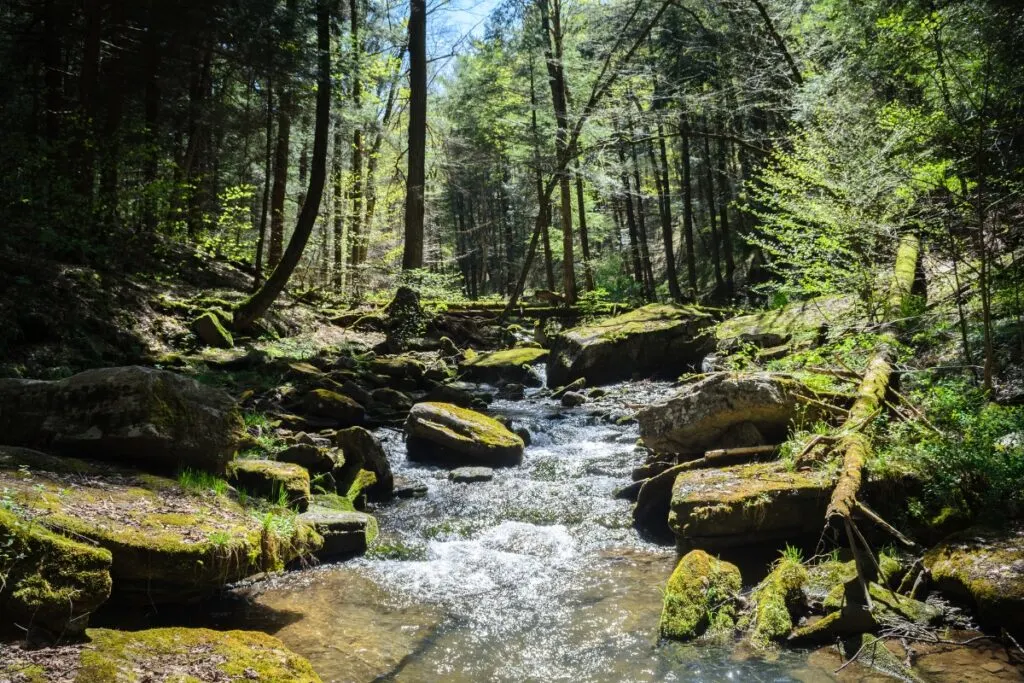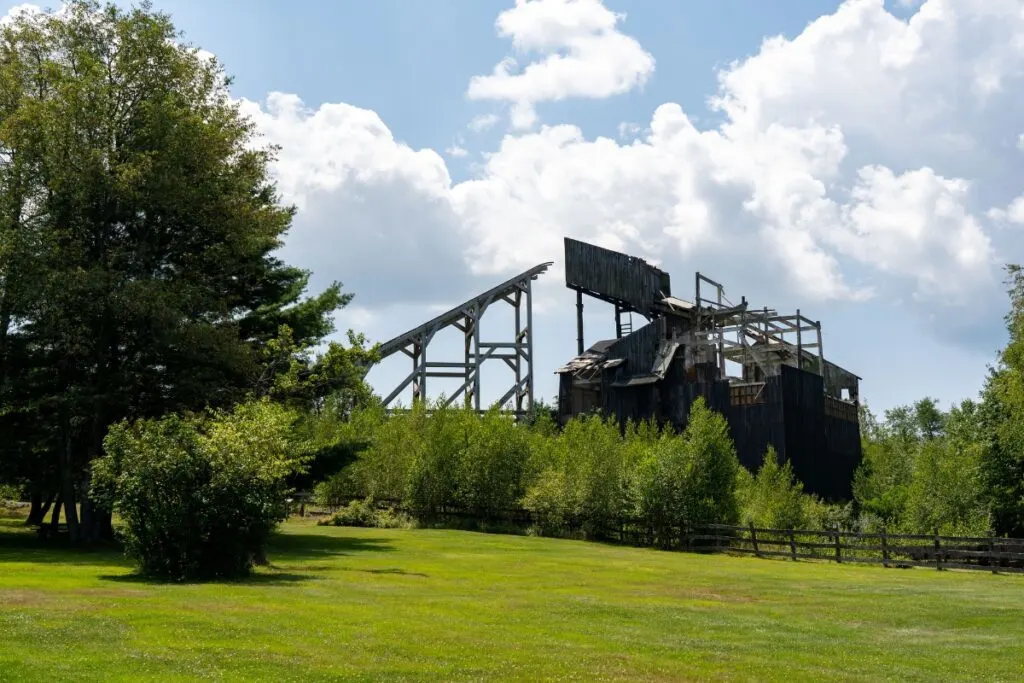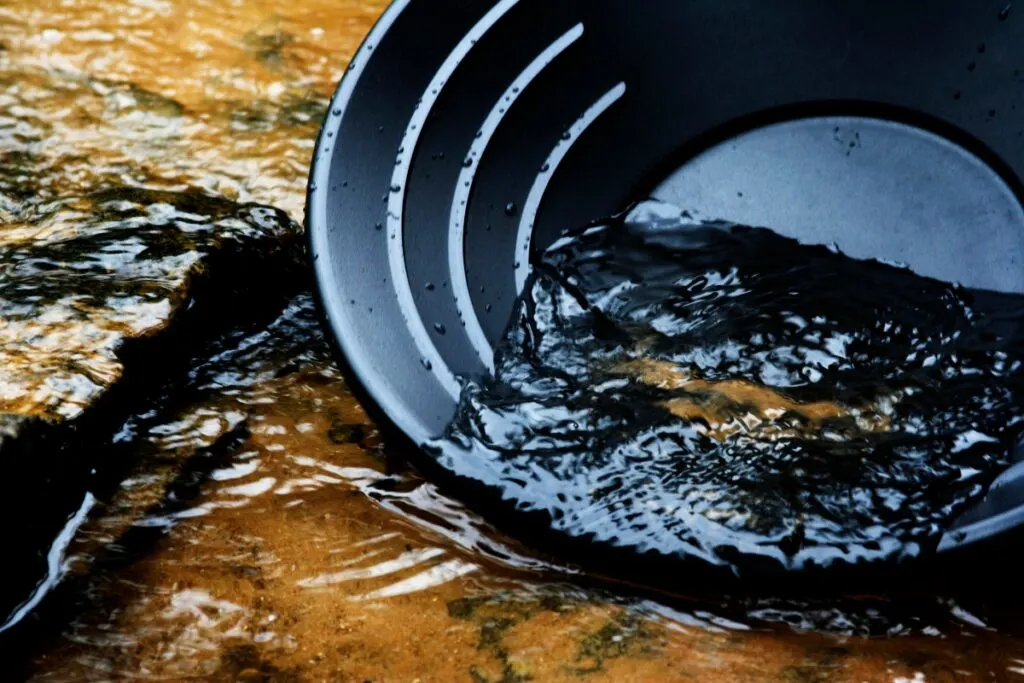As an Amazon Associate, I earn from qualifying purchases with no additional costs for you.
And while Pennsylvania isn’t the first place to come to mind when you think about gold rushes or wild prospecting adventures, it certainly has an untold story worth hearing. Gold prospecting in Pennsylvania is a blend of anticipation and patience, a dance with nature that can range from exhilarating to peaceful. It’s about scanning the river’s bend and understanding the earth in a way few of us take the time to.
The best gold prospecting locations in Pennsylvania are:
- Clearfield County
- York County
- Clarion River
- Allegheny River
- Seven Tubs Recreation Area
- Lancaster County
- Schuylkill River
As you further, we’ll dive into the art of gold panning in Pennsylvania, revealing seven of the best spots to search for this precious metal. Additionally, we’ll also expand on the legal aspects of gold prospecting, ensuring your treasure hunt is both fun and law-abiding.

If you want to check out the best tools and equipment for gold prospecting, you can find them by clicking here (Amazon link).
The Legality of Gold Prospecting in Pennsylvania
If you adhere to the rules and regulations, gold panning is always legal, irrespective of the state you decide to stick it rich. To be on the safe side, you’ll need to:
First, ascertain who owns the mineral rights in the area you’re planning to explore. It might be the state, it might be a private entity, or it might even be you if you’re prospecting on your property.
Moreover, these rights can sometimes be split from surface ownership, creating a complex matrix of legal considerations. You’ll need their permission if the mineral rights belong to someone else. And if the land is state-owned, like in state parks, you’d need a permit.
This is where it gets interesting – the Pennsylvania Department of Conservation and Natural Resources (DCNR) generally doesn’t issue permits for mineral prospecting in state parks. Although there is an expectation; the DCNR does allow for recreational gold panning in state parks.
This means that, while the state may hold the mineral rights, it allows folks to partake in this old-time hobby, with the caveat that it should be non-mechanized, recreational, and not disruptive to the park environment.
So, can you pan for gold in Pennsylvania? The answer is yes but with a series of legal caveats attached.
7 Best Places To Find Gold in Pennsylvania
The state of Pennsylvania offers a wealth of opportunities for gold prospectors. Here are the seven best places to find Gold in Pennsylvania:
Clearfield County
Clearfield County is a hotspot for gold seekers. Nestled in the heart of Pennsylvania, the streams here are said to have flakes of treasured minerals. Known for its gold-bearing streams, Clearfield County holds many surprises for the gold seeker.
Little Clearfield Creek and Moose Creek are excellent starting points here. The gold found here tends to be small, so prepare for a hunt that requires a keen eye and a lot of patience.
Did you know that gold lies in quartz? So while you’re scouring those riverbeds, watch for quartz deposits. You never know; gold could be just a stone’s throw away!
York County
York County was the scene of the state’s biggest gold rush in the 1800s. Muddy Run, located in the southeastern region, is well-known for gold flakes. Numerous creeks here have been proven to contain gold, such as the Conewago, Beaver, and Codorus.
You only need a sunny day, a good gold pan, and a can-do attitude. Gold here is concentrated in the form of small flakes and dust, especially in the tributaries of the Susquehanna River.
It’s a place where patience and perseverance are rewarded, a testament to the enduring spirit of the true prospector.
Clarion River
The Clarion River at the East Branch of the Clarion River is a humble yet quietly promising site. Situated in the heart of Elk County, this river is said to harbor small gold deposits. The East Branch of the Clarion River is known for its placers teeming with gold.
This river was famous among seasoned prospectors and saw extensive gold discoveries during the 19th century. The river’s high mineral content and rugged terrain make it a prime gold hotspot, with plenty of opportunities for panning and sluicing.
TIP: Find out my recommended products if you are looking for the best tools you need to find gold (Amazon link):
- Gold Metal Detector: Bounty Hunter TK4 Tracker
- Gold Pan: Stansport Deluxe Gold Pan
- Sluice Box: Stansport Aluminum Sluice Box
- Shovel: Radius Garden Carbon Steel Shovel
- Snuffer Bottle: Stansport Snuffer Bottle
Allegheny River
The Allegheny River in the Western part of Pennsylvania. The river, a reliable gold-prospecting spot, often provides prospectors with small deposits of gold. A site filled with surprises, where a golden discovery could be just a pan swirl away.
Historically, this area has been a bustling spot for gold seekers. The placid Allegheny River, stretching over 325 miles, is another hotspot for gold seekers. Its gold deposits are typically small but plentiful.
The river’s banks and surrounding tributaries have brought joy to many prospectors over the years.
TIP: Check out the article below if you also want to know about the best rockhounding spots in Pennsylvania:
Rockhounding in Pennsylvania: Where to Go & What to Find
Seven Tubs Recreation Area
The Seven Tubs Recreation Area, Near Wilkes-Barre, in Luzerne County, is a park that’s known for more than just its beautiful hiking trails and picturesque water tubs.
With its sparkling Wheelbarrow Run stream, this park is a golf enthusiast’s dream come true. This is not just a day out; it’s a step back into the golden prospecting era.
This nature area in Luzerne County is not just a tourist attraction. The flowing waters have been rumored to carry gold deposits, making the place a perfect blend of beauty and prospecting potential.
Lancaster County
Lancaster County, in the heart of Pennsylvania, is renowned for its quaint Amish country charm and rich mineral resources.
Home to some of the oldest mines and quarries in the United States, the county’s geology has fascinated mineral collectors, researchers, and prospectors for years.
Muddy Run Creek is the most recognized location for gold prospecting in Lancaster County. Its scenic beauty and natural gold deposits make it an attractive prospect for those with a pan and a dream.
This location is often found to contain ‘placer gold,’ that is, gold fragments and nuggets that have been weathered from their original host rock and transported downstream.
Schuylkill River
The Schuylkill River, flowing through southeastern Pennsylvania, has been known to yield some fine placer gold. The Schuylkill River, Stretching over a hundred miles, has had numerous gold finds reported.
If you’re willing to take the time to pan the river’s sands, you could uncover some lovely gold flakes. It’s an adventure that certainly promises more than just a golden reward.
TIP: Simple gold panning is among the most allowed gold prospecting techniques you can use almost anywhere. Check out other effective methods in the article below:
The 7 Most Effective Gold Prospecting Techniques Explained
Active, Old & Abandoned Mines
Pennsylvania’s active, old, and abandoned mines provide unique opportunities for gold prospectors to learn the ropes of past history. Below we explore notable mines and identify their current status.
Cornwall Iron Mines (Old)
The Cornwall Iron Mines, Once the largest iron deposit east of Lake Superior, Considered one of the oldest mines in the country, Cornwall Iron Mines, or Cornwall Banks, were operational from 1732 to 1973.
In its prime, Cornwall was one of the largest iron producers in the world. Today, it stands as a National Historic Landmark, educating visitors on the crucial role of iron mining in the American Revolution and the Industrial Age.
The site is now a National Historic Landmark, housing the Cornwall Iron Furnace, which showcases the history of Pennsylvania’s iron industry.
Pioneer Tunnel Coal Mine (Old)
The Pioneer Tunnel Coal Mine, Once a significant anthracite coal mine, Pioneer Tunnel ceased operations in the 1930s.
Today, it’s a popular tourist attraction providing guided mine tours, illustrating the tough conditions early miners had to endure, offering guided tours that provide a glimpse into the life and work of coal miners.
Lackawanna Coal Mine (inactive)
The Lackawanna Coal Mine, Located in the heart of Scranton, was operational from 1860 until 1966. Currently, it serves as the Lackawanna Coal Mine Tour, where visitors can experience a journey 300 feet beneath the earth into an anthracite coal mine.
Today, it operates as the Lackawanna Coal Mine Tour, providing the public with a rich, immersive experience of the life of a coal miner during the mine’s heyday.
Lackawanna Coal Mine is no longer active. But don’t let its quiet demeanor fool you; it’s been transformed into an engaging tour site, offering an underground journey into the world of a 19th-century anthracite coal miner.
TIP: Starting your gold prospecting journey depends on your seriousness and knowledge. Check out the ultimate guide on starting gold prospecting in the article below:
Ultimate Beginner’s Guide: How To Start Gold Prospecting
Gold Prospecting Clubs in Pennsylvania

Gold prospecting clubs can be an excellent way to learn more about gold panning, network with other enthusiasts, and gain access to exclusive prospecting areas. Here are some prominent gold prospecting clubs in Pennsylvania:
Pennsylvania Gold Prospectors Association (PGPA)
The Pennsylvania Gold Prospectors Association is an influential club committed to teaching the art of panning and sluicing. Their outings, hosted across the state, provide hands-on training and camaraderie.
Their mantra, “Gold is where you find it,” aims to preserve and promote the exciting tradition of gold prospecting in Pennsylvania.
Gold Prospectors Association of America( GPAA)
The Gold Prospectors Association of America is a national club with a significant presence in Pennsylvania. Known for their educational resources and extensive network, they’re an excellent choice for anyone seeking to delve deeper into the world of gold prospecting.
Lost Dutchman’s Mining Association (LDMA)
The Lost Dutchman’s Mining Association Camp presents an exclusive, member-only opportunity for gold prospecting. Here, the blend of beautiful natural surroundings and the allure of the hunt for gold create a unique, enriching experience.
Gold Prospectors Association of America – Northern Pennsylvania (GPAA-NP)
The Prospectors Association of America: Northern Pennsylvania chapter stands out in the gold prospecting scene. Located in the northeastern part of the state, the Gold Prospectors Association of America’s Northern Pennsylvania Chapter (GPAA-NPA) provides an excellent opportunity for prospecting enthusiasts.
The club organizes outings and educational seminars to teach members about the nuances of gold prospecting. There’s a strong camaraderie, with members readily sharing tips, tricks, and local prospecting lore.
It offers resources for all levels of prospectors, including educational activities, outings, and opportunities to network with other prospectors. The GPAA-NP strives to uphold the tradition of gold prospecting while promoting environmental respect.
TIP: Nothing in this world is impossible, and finding gold in your backyard is rare but can never be ruled out. Find out helpful tips in the article below:
Guide: PRO Tips On How to Find MORE Gold in Your Backyard
Gold Panning Tours in Pennsylvania
These tours typically provide the necessary equipment and guidance from experienced prospectors, ensuring a fun and educational experience. Here are some gold panning tours in Pennsylvania:
Eldorado Gold Panning Tours
The Eldorado Gold Panning Tours, Based in the heart of Pennsylvania’s gold country, Eldorado, offers guided tours that let you live the gold panner’s life under the watchful eye of experienced professionals.
A true hidden gem in the Keystone State. In Bedford County’s scenic wilderness, Eldorado offers an authentic gold panning experience, bringing the gold rush era back to life.
Eldorado’s guided tours come with the option of expert panning instructions, making it a fantastic choice for beginners. Don’t miss their annual Gold Rush Days event for an immersive experience featuring gold panning contests and old-time music performances.
Penn Gold Prospecting Tour
The Penn Gold Prospecting Tour, located in the state’s eastern region, offers an immersive gold panning experience with a personalized touch. Penn Gold is unique as they offer private tours for individuals and small groups.
You’ll get hands-on training from expert prospectors, who guide you through the gold panning process. Penn’s Cave allows you to pan for gold while exploring a stunning limestone cave, delivering an adventure-packed combo that’s hard to resist.
The prospector package also includes a wildlife tour, making it a full-day escapade for the whole family. To add to the thrill, they also offer Metal Detecting adventures where you can search for hidden treasures and relics from the past.
Cooper’s Gem Mine Tours
The Cooper’s Gem Mine Tours, which, despite its name, is an equally popular hotspot for gold enthusiasts. Cooper’s stands out with its gem mining and gold panning activities.
This tour is ideal for those seeking to delve into the region’s geological history, explore unique rock formations, and, of course, pan for gold.
Plus, their guides are fantastic storytellers, spinning tales that will take you back to when gold panning was a way of life. For those looking for more, their gem-cutting workshops and geology lessons provide an educational spin to your trip.
TIP: The gold sluice box is a time-saving alternative to the traditional panning for gold. Check out helpful tips on using the sluice box correctly in the article below:
Find More Gold: Tips On How To Use Sluice Box Properly
Gold Prospecting Law: ls Gold Panning Legal in Pennsylvania?

If prospectors follow the appropriate rules and regulations, gold panning is legal. Here’s what you need to know about gold prospecting laws:
Understanding Pennsylvania Gold Prospecting Laws
In Pennsylvania, recreational gold panning is permitted. As long as you follow the state and local rules, you’re on the right path. Some regulations to be aware of include the following:
State-Owned Lands
It’s generally permitted to pan for gold in Pennsylvania state-owned lands. However, check with the specific park’s or forest’s rules, as some may prohibit or limit gold panning.
Private Property
As for private property, always obtain permission from the landowner before prospecting. Prospecting without permission can be considered trespassing, leading to legal consequences.
Protected Sites
The areas known as “Areas of Environmental Concern” (AEC) are off-limits for gold panning due to their delicate ecosystems. You must steer clear of these protected areas.
Important Considerations for Prospective Gold Prospectors
Sure, it’s legal, but what else should you know before you plunge headfirst into your gold prospecting adventure in Pennsylvania?
Equipment
Basic equipment like pans and small hand shovels are generally allowed. Pennsylvania law prohibits using mechanized equipment or explosives for gold prospecting and panning.
This ensures the process is non-disruptive to the land. However, mechanized or motorized mining equipment may be prohibited or require special permits.
Environmental Impact
Always follow Leave No Trace principles. Refrain from disrupting the environment, including the water flow, the river banks, and restrictions on prospecting in certain waterways, particularly those home to endangered species or designated as outstanding natural resources.
Safety Measures
Gold panning requires patience and can be physically demanding. Always prioritize your safety and be prepared for unexpected weather conditions.
General State Laws
Gold panning, surprisingly enough, is indeed legal in Pennsylvania. However, it comes with its own set of guidelines and regulations.
Most of the state’s gold reserves are found in the southeast portion, particularly in York County. Nevertheless, before one begins their treasure hunt, it’s imperative to understand the laws governing this activity.
Land Ownership Laws
Gold found on private property typically belongs to the property owner. Therefore, securing permission from the property owner before initiating any gold prospecting activities is crucial. Trespassing while prospecting can lead to criminal charges.
Public Lands
Gold prospecting is permitted on certain public lands in Pennsylvania. Most notably, this includes areas controlled by the Bureau of Land Management (BLM). However, certain regulations apply to protect the environment and local wildlife.
Regulations on Selling Found Gold
The state also imposes regulations on selling found gold. It is required to report large finds to the state, and taxes may be applied to the sale of gold.
Responsible Gold Prospecting Practices
While the allure of gold might be appealing, it’s also critical to respect the land and its history. This means filling in any holes dug and not disturbing local wildlife. Prospectors should adhere to the principle of “leave no trace.”
TIP: Gold panning is legal in the U.S. however, you must remember that every state has gold panning laws. Find out the complete guide on gold panning law in the article below:
Complete Guide: Is Gold Panning Legal & Where Can You Pan?
Tips on Getting a Gold Claim in Pennsylvania
Consider taking a gold claim if you’re serious about gold prospecting in Pennsylvania. Here are some tips to get you started:
What is a Gold Claim?
A gold claim is a right granted to an individual or group to prospect and extract gold from a specific land area. It’s important to note that a gold claim doesn’t constitute land ownership but the rights to the minerals underneath.
Legal Requirements
Before you start your gold prospecting journey, it’s important to understand the legal aspects of obtaining a gold claim. The first step in this process is to know the regulations by the Bureau of Land Management (BLM) and the Pennsylvania Department of Environmental Protection (DEP).
It’s not all tangled in legal jargon – there’s a certain thrill in decoding these laws! Legal Requirements. This landmark legislation, still in effect today, governs staking gold claims. It allows citizens of the United States to explore for minerals and, upon discovery, stake a claim on federal lands.
Each state has its regulations for mining operations, and Pennsylvania is no exception. Always consult with local county clerk offices for specific requirements and procedures.
Locating Potential Gold Claims
Once you’re armed with legal knowledge, it’s time to get your hands dirty. The gold-panning locations in Pennsylvania are mostly in the southern and western parts of the state.
But it’s not just about randomly picking a spot; research, topographic maps, and historical records will be your trusted guides.
Look for rivers and streams that have historical evidence of gold finds. Understanding the geology of an area is also vital. Once you’ve identified prospective areas, fieldwork comes into play.
This includes physical exploration, sample collection, and testing to verify the presence of gold.
Staking Your Claim
First, you’ll need to identify a promising site to stake a gold claim in Pennsylvania. Then, you must check if the land is public or private. If it’s private, you must secure permission from the landowner.
If it’s public, check with the local authorities or the Bureau of Land Management to see if any claims are already established.
If not, you can file a claim, which usually involves filing a fee and paperwork. But remember, this isn’t the Wild West anymore; there are rules to follow.
TIP: Pennsylvania is a state that’s rich in historical sites and mining, but it’s also rich in rocks and minerals for rockhounds.
10 Common Rocks & Minerals You Can Find in Pennsylvania
Marking the Claim
Physically marking the claim on the ground is another crucial step. This process, known as ‘staking,’ usually involves setting up corner posts or monuments around the claim’s boundaries.
Processing Your Claim
Securing a claim isn’t the end of your journey; it’s the beginning of a new adventure. Learn about the gold prospecting techniques and equipment to start mining your claim. Is it hard work? Yes. But the potential payoff is worth the effort.
Maintaining Your Claim
Remember, holding a claim involves recurring obligations, like annual paperwork to the Bureau of Land Management (BLM) and maintaining the claim markers.
You must also perform a certain amount of ‘assessment work’ each year, which essentially involves improving the claim or demonstrating continued interest in it.
TIP: Find out my recommended products if you are looking for the best tools you need to find gold (Amazon link):
- Gold Metal Detector: Bounty Hunter TK4 Tracker
- Gold Pan: Stansport Deluxe Gold Pan
- Sluice Box: Stansport Aluminum Sluice Box
- Shovel: Radius Garden Carbon Steel Shovel
- Snuffer Bottle: Stansport Snuffer Bottle
Wrapping Up
The dream of striking gold may seem like an elusive fantasy. But with careful research, adherence to the law, a bit of geological knowledge, and a lot of patience, you can significantly enhance your chances of joining the ranks of those who’ve successfully claimed gold in Pennsylvania.
While it might seem perplexing, the potential rewards make it worthwhile. Always remember, the quest for gold is not just about striking it rich—it’s also about the thrill of the chase, the satisfaction of hard work, and the love of nature’s bounty.
And who knows your claim may soon glitter with the promise of hidden treasures. Happy prospecting!
TIP: You need to know how gold deposits occur to understand which rocks to look for when prospecting. Find out more in the article below:
5 Rocks You Need To Look For When Gold Prospecting (+ Why)
